(CNN) -- Both Time magazine's Michael Ware and CNN's Nic Robertson have spent many days in war zones and know the danger of reporting from Iraq.
On Monday, they reflected on the bombing that wounded ABC anchor Bob Woodruff and cameraman Doug Vogt. Ware and Robertson told CNN anchor Soledad O'Brien that journalists are increasingly being targeted.
O'BRIEN: The area where this attack took place on Bob Woodruff and his cameraman Doug Vogt, can you tell us about it?
WARE: It is an area just north of the capital, Baghdad, a place called Taji. Now under Saddam's regime, it was part of the heart of Saddam's munitions-making industry, so there's vast plants and bunker complexes that were there after the invasion, full of bombs and weapons, many of which have leaked out and are now in the hands of the insurgents. That means it's a particularly deadly area for IEDs, or improvised explosive devices.
I know an American unit that I'm very close to, and one of their Bradley Fighting Vehicles was torn apart like a tuna can. And six men died inside from one IED...
O'BRIEN: Is there a sense that the insurgents are targeting journalists? I mean, would they know in that area that this is a journalist who is traveling with the U.S. military and the Iraqi military, or do they just blow up any convoy that looks like it's U.S. military and Iraqi military?
WARE: Look, in this instance, I suspect it's extremely unlikely that they knew that this was a journalist, or they knew that this was Bob who is in that vehicle. This is, I suspect, just a preplanned attack on a U.S. or Iraqi army convoy.
However, journalists are being targeted in this conflict in a way that we really haven't seen in previous conflicts. We are seen as legitimate targets, as part of the problem rather than the solution, according to the insurgents.
O'BRIEN: Nic, do you agree with that? And if you do, why do you think that is?
ROBERTSON: Absolutely. The journalists in this conflict have been put in the crosshairs, as opposed being caught up in the crossfire in previous conflicts.
I think perhaps when you look at what the insurgents are targeting -- they are targeting Iraqi police, they are targeting Iraqi army, they are targeting the U.S. military far more than they're targeting journalists. They're targeting people working in the Iraqi government. So I think if they were to put journalists at the top of their target list, we would see far more casualties in the journalists ranks.
But absolutely, Michael is right, that journalists are now a legitimate target in this conflict in a way they haven't been before, and that's because we're associated with Western ideals and values, and that's what they are opposed to at this time.
O'BRIEN: We are looking at pictures a moment ago, Nic, and I remember that live shot, where as you were doing your live shot, you were sort of ducking out of the way because there was small arms fire around you. And at one point, finally, you just duck down and you say, "I got to get out of here, they're calling us back in." For those of watching, so scary, because we don't really know what's going on, and obviously for you, too.
Michael, let met ask you another question. You must travel, working for Time magazine, with these big security details, armed guys, lots of vehicles. Does that help, or does sometimes it make you more noticeable?
WARE: Well, that, in fact, is the case. I mean, this is a matter of great debate among the press corps, and it becomes a matter of personal choice, either for the individual journalists or the news organization. We, for example, like to move about in beat-up looking Iraqi vehicles. They're soft skinned. They're not armored. We don't have Western security forwards. We have Iraqis. Our weapons are never seen.
So as much as possible, we try to go under the radar and blend. But should the situation arise, we're able to defend ourselves. This is the way journalists have to work. It's such a dire situation. It's very hard to express.
O'BRIEN: Nic, we've talked about this, you and I together, in person, a couple of times. Why do you cover this story? I mean, you have a family. It's so dangerous. And I know you, and I know Michael, and I know Bob and I know everybody who is there understands how risky it really is.
ROBERTSON: Absolutely, and the risks go through your mind, particularly when you go to a dangerous location. Some areas are slightly safer than others, but when you're in there, you're very aware of that. You're very aware that every time you go out of a safe building or out of a military base, then the potential is very much there to be attacked. And it goes through your mind.
The reason we do it is we believe with a passion that this is a story that is very important, that it has huge and long-reaching implications, and we're interested in the human dynamic as well of what's happening to the people in Iraq, what's happening to the U.S. troops who are serving there.
Without us, in a way, people would not hear what's happening. I know when we're embedded with U.S. troops, they say they are so thankful that their families back home can see what they're doing, can see what's happening. There's a disconnect between them and Iraq and their families back home. So in many ways, we're providing a bridge of information for people.









